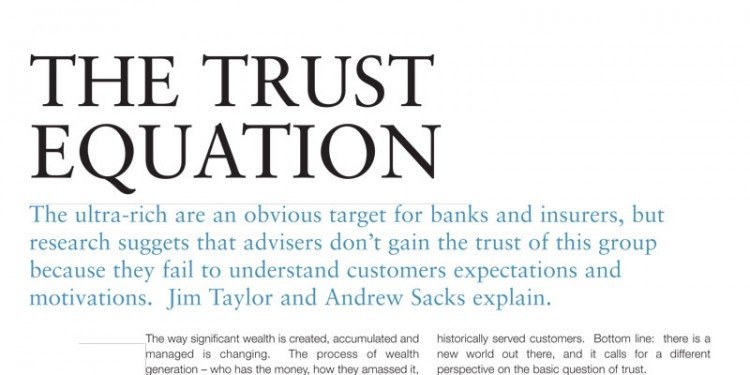The ultra-rich are an obvious target for banks and insurers, but research suggests that advisers don’t gain the trust of this group because they fail to understand customers expectations and motivations. Jim Taylor and Andrew Sacks explain.
The way significant wealth is created, accumulated and managed is changing. The process of wealth generation – who has the money, how they amassed it, and the way they handle it – has changed dramatically in the United States. These shifts are now beginning to be seen worldwide.
The transformation began with the way fortunes were built. Fortunes typically arise out of an individual’s capacity to develop an idea, attract a team of loyal adherents, demonstrate market viability, attract capital and put the idea into the market. In other words, we are now seeing a real emergence of entrepreneurial wealth and, with it, the triumph of middle-class values – the cornerstone of the entrepreneur’s motivation and strength of character.
Fortunes are built by those consumed by a sense of personal empowerment, customer entitlement, and employee empowerment. Bringing these attitudes to their businesses, they also communicate them to the financial advisors who manage their fortunes. This essay derives its observations from both the Worth Harrison Taylor Study on the status of wealth in America and a second, separate study conducted with the help of AgencySacks1, in which we asked luxury marketers to predict how the wealthy would respond to the questions posed in the first study.
We will not dwell here on the data, but rather concentrate on what lessons the studies have for luxury marketers wishing to play a role in the financial lives of wealthy families by serving as stewards of this new entrepreneurial wealth. The research demonstrates that new wealth comes with a set of expectations that challenge the way financial services providers have historically served customers. Bottom line: there is a new world out there, and it calls for a different perspective on the basic question of trust.
The observation that the financial services industry is in something of a trust crisis is not new. This topic has been covered extensively in recent issues of Argent. Phillip Williamson2, for example, argued that loss of trust in industry can be attributed to a combination of scandal, unreasonable account returns, a generally difficult risk environment, and the failure of service providers to offer value-based products and superb service.
To read the full article, please download the PDF above.

